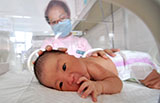Strides made against viral hepatitis
By Wang Hongyi (chinadaily.com.cn) Updated: 2012-06-24 21:44Viral hepatitis will be under control in the next 20 years thanks to the fast development of hepatitis vaccines, experts said at an international symposium on viral hepatitis and liver disease in Shanghai over the weekend.
"So far, the number of hepatitis B carriers has dropped from 9.65 percent in 1992 to the current 7.17 percent after the country's series of effective efforts, such as introducing the hepatitis B vaccination into the national immunization program and carrying out safe blood transfusion measures," Wen Yumei, a professor at the medical school of Fudan University and an academician with the Chinese Academy of Engineering.
"That is to say, about 30 million Chinese have avoided catching the virus in the past decade," she said at the 14th International Symposium on Viral Hepatitis and Liver Disease, which attracted over 2,500 participants from 44 countries and regions.
Hepatitis B is a viral infection that attacks the liver and can cause acute and chronic disease. It is transmitted through contact with infected blood or other body fluids, not by casual contact, according to the WHO.
According to the Ministry of Health, viral hepatitis ranked first among the 28 officially supervised diseases last year, with 1.37 million cases.
To date, China has achieved the Asia-Pacific regional goal of reducing chronic hepatitis B infection rates to less than 1 percent among children up to age 5, according to the WHO.
At the symposium, researchers and experts in viral hepatitis from around the world provided summary updates on advances in the understanding, diagnosis, prevention, control and treatment of the five forms of viral hepatitis. They reviewed the success of public health measures taken to control and prevent viral hepatitis.
In China, research and discoveries on viral hepatitis have improved greatly in recent years, and more academic articles by Chinese scientists have been published in first-class scientific journals in the world, experts said.
- China adopts local government debt ceiling
- China's economy operating within appropriate range: Premier
- Lost memories of Beijing
- Ticket costs must not rise too fast, official warns
- Urbanization drives use of resources
- Report sees obstacles to progress
- All certified GM foods on market 'are safe'
- China finally wins Thailand railway project
- Stem cell donor offers ray of hope for US boy with leukemia
- Overtime becomes norm for white-collar employees







